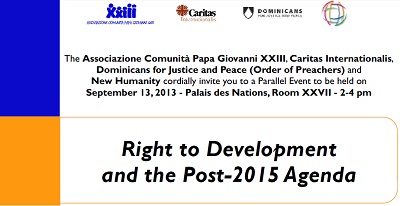Geneva: N.H. chairs the side event on the “Right to Development and the Post-2015 Agenda”

Dr. Jorge M. Dias Ferreira, New Humanity’s Main representative in Geneva, chaired the side event to the 24th regular session of the UN Human Rights Council entitled: “Right to Development and the Post-2015 Agenda”.
The event took place on 13th September in conference room XXVII of the Palais des Nations and was organized jointly by New Humanity and Associazione Comunità Papa Giovanni XXIII (APG23), Caritas Internationalis and Dominicans for Justice and Peace (Order of preachers).
The co-organizers also included the Permanent Mission of Italy to the UN in Geneva, the Geneva Forum of Catholic-inspired NGOs, the working group of Catholic-inspired NGOs for the Right to Development, IIMA, OIDEL, VIDES International, Association Points-coeur and Francisans International.
The participants numbered roughly fifty and included representatives of various international NGOs and National Delegations as well as the Head of the Section for the Right to Development of the Office of the High Commissioner for Human Rights (OHCHR).
Also present were the participants of the Henry Durant University College Summer Course in Human Rights, amongst whom two members of New Humanity (See the related article).
 “As regards the right to development – mentioned Dr. Ferreira in his introduction – we have marvellous documents. Unfortunately, however, the principles expressed in these documents have not always been put into practice.
“As regards the right to development – mentioned Dr. Ferreira in his introduction – we have marvellous documents. Unfortunately, however, the principles expressed in these documents have not always been put into practice.
We NGOs exist, then, for this very end: to make sure that all the principles which the international community has produced over the years, are developed and put into practice. Let’s see to it that these are not mere words, but deeds born of the commitment of all of us!”
Echoing Dr. Ferreira’s words, was the presentation “Current situation and future prospects for working groups on the Right to Development”, made by Her Excellency Ms. Tamara Kananayakam, Head of the Intergovernmental Group for the Right to Development.
“The millennium goals were framed against a backdrop of inequality – stated Ms. Kananayakam- which has made inevitable a long series of malfunctions. This is a structural problem which therefore requires a radical change of approach which will have to be in place for the post-2015 Development Goals. In particular, instead of an approach designed to redistribute resources, we will have to focus on the affirmation of the rights laid out in the principal international conventions.“
 “Creating a transformational vision of the Declaration of the Right to Development” was, in turn, the central issue of the contribution from Dr. Shiami Puvimanasinghe, member of the Section for the Right to Development of the OHCHR. The key moment in his speech was his appeal that “the concept of development find a favourable environment for human rights at every level, making thus possible the realization of the entire potential of the human being (physically, psychologically, emotionally and spiritually). In this way, the right to development enters structurally into the sphere of human development.”
“Creating a transformational vision of the Declaration of the Right to Development” was, in turn, the central issue of the contribution from Dr. Shiami Puvimanasinghe, member of the Section for the Right to Development of the OHCHR. The key moment in his speech was his appeal that “the concept of development find a favourable environment for human rights at every level, making thus possible the realization of the entire potential of the human being (physically, psychologically, emotionally and spiritually). In this way, the right to development enters structurally into the sphere of human development.”
Mrs Maria Merceds Rossi, chief representative of APG23 in Geneva, then offered the perspective of the Catholic-inspired NGOs with regards to the Post-2015 Agenda: “The first objective must be to eradicate poverty – she began – but it is then necessary to focus on a concept of development centred on the all-round development of the individual. Our commitment is, therefore, to work towards making the Post-2015 Agenda much more detailed and towards a proposal for an inclusive globalization which takes account of cultural diversity, an economy of solidarity and cooperation and, also, the concept of subsidiarity.”
Lastly, Ms. Arafa Cherif, member of Caritas Geneva, examined the Right to Development as seen from the perspective of migrants. Through the experience of a Chadian female migrant, brutally mutilated for having refused a forced marriage, she reminded all present that while many countries have ratified numerous conventions on the Right to Development, the problem of their implementation and of the violence of which the victims are always, above all, women and children is still unresolved.


